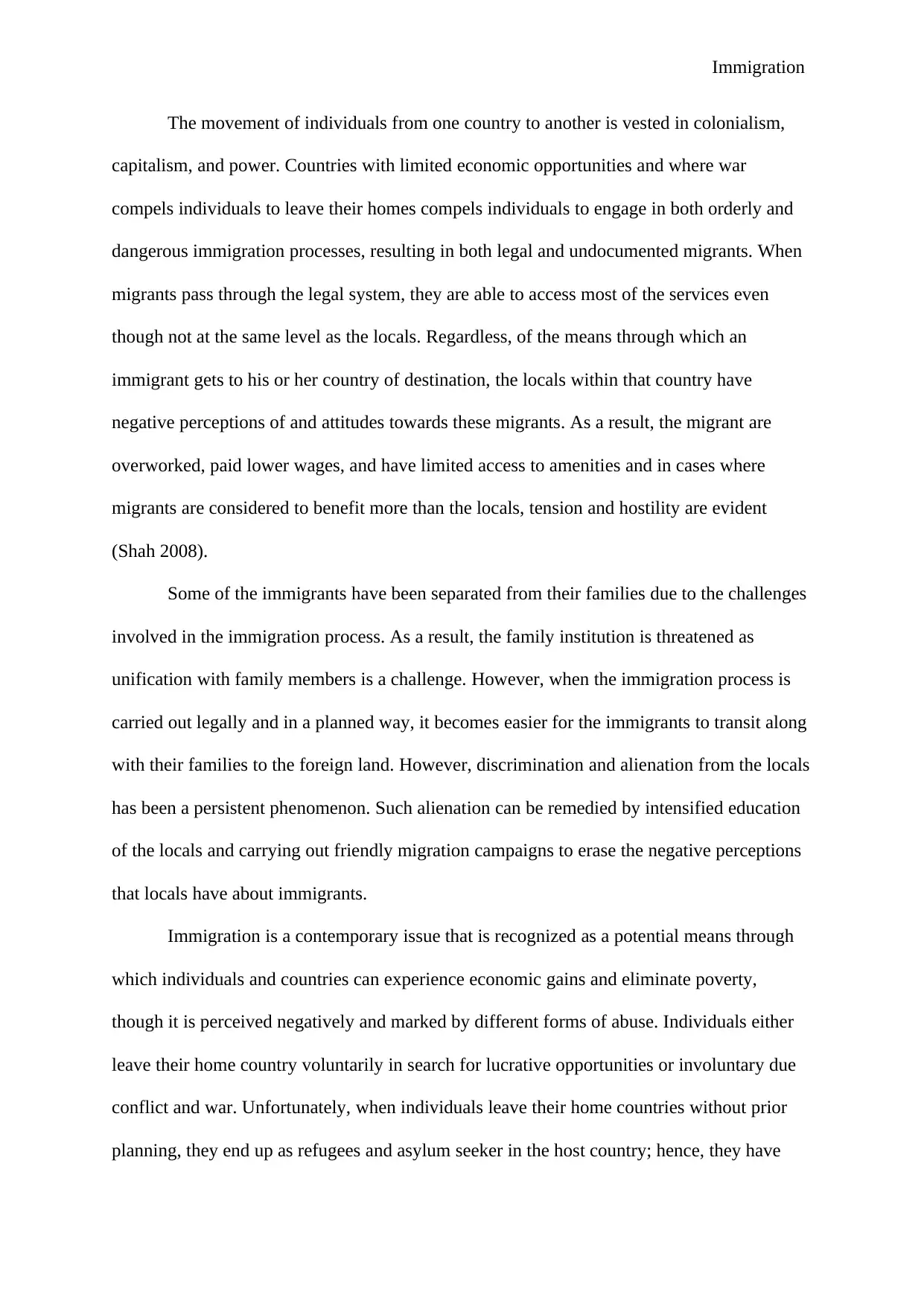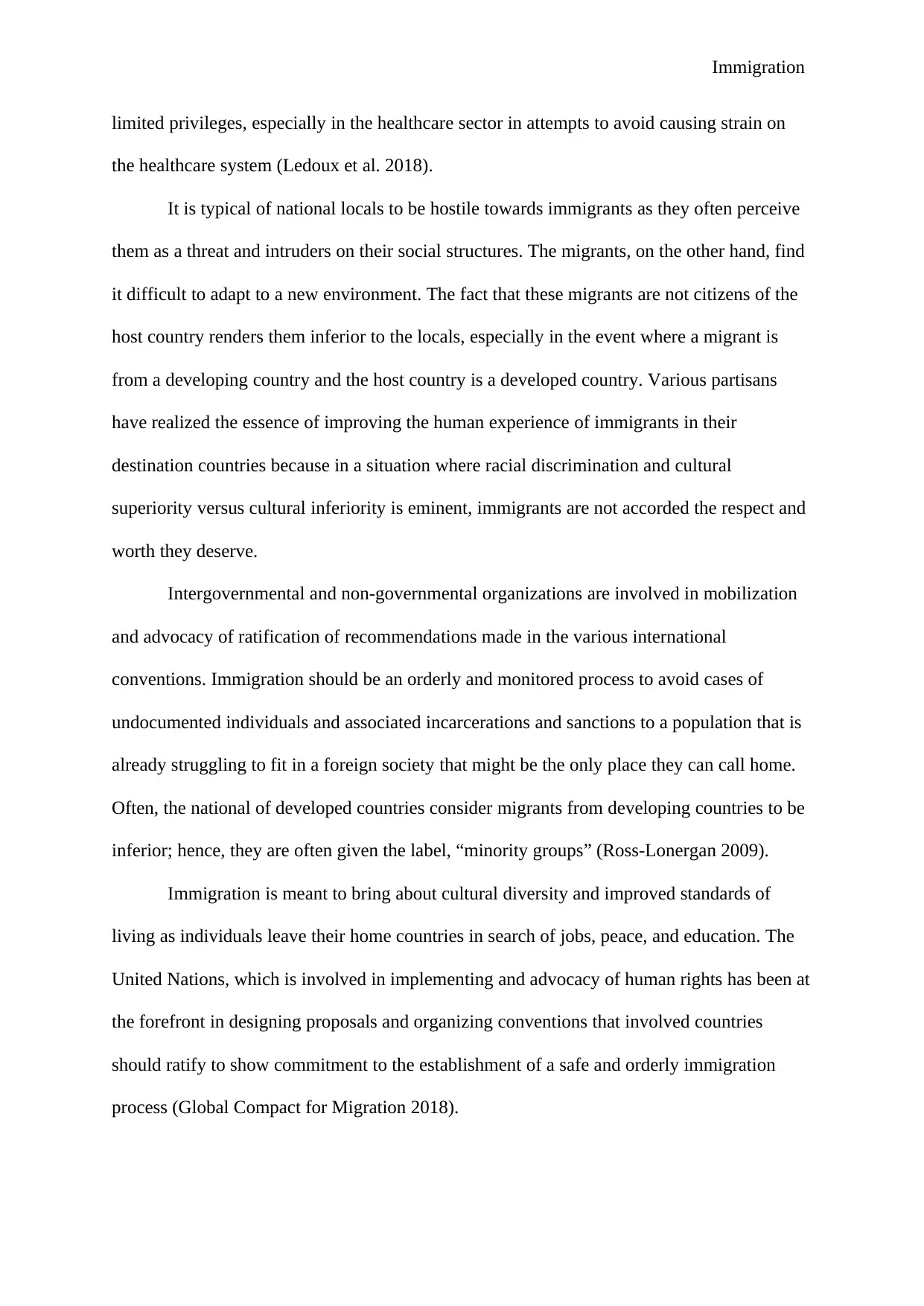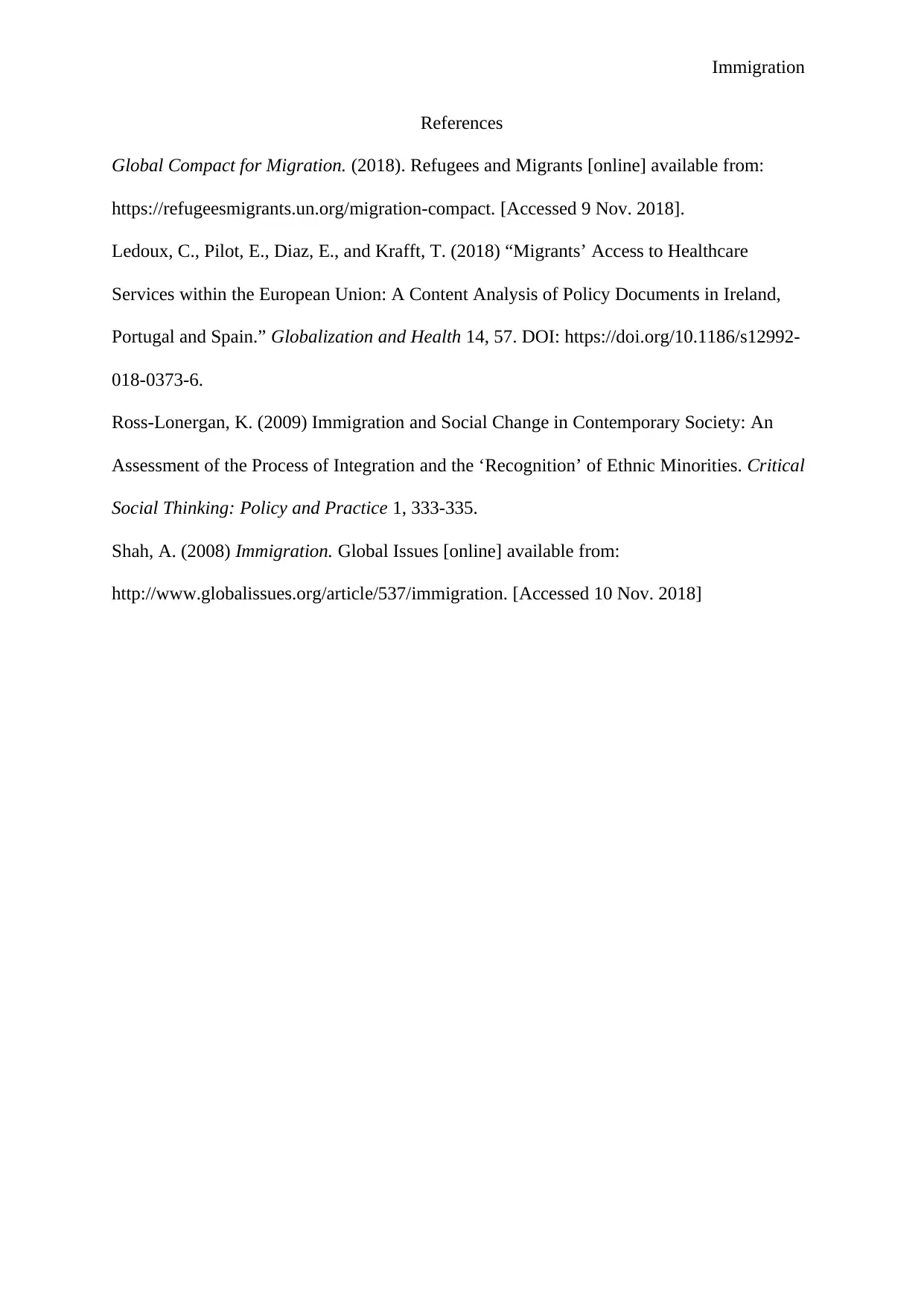Immigration Essay: Contemporary Issues and Societal Responses
VerifiedAdded on 2023/05/29
|4
|856
|310
Essay
AI Summary
This essay delves into the multifaceted issue of immigration, exploring its origins in colonialism, capitalism, and power dynamics. It examines the experiences of both legal and undocumented migrants, highlighting the challenges they face, including negative perceptions, discrimination, and limited access to resources. The essay discusses the impact on families and the importance of planned and orderly immigration processes. It also touches upon the role of international organizations in advocating for immigrant rights and improving their human experience. The essay concludes by emphasizing the need for education and friendly migration campaigns to combat negative stereotypes and promote cultural diversity and improved standards of living.

Immigration
Immigration
Name
Course
Professor
Institution
City, State
Date
Immigration
Name
Course
Professor
Institution
City, State
Date
Paraphrase This Document
Need a fresh take? Get an instant paraphrase of this document with our AI Paraphraser

Immigration
The movement of individuals from one country to another is vested in colonialism,
capitalism, and power. Countries with limited economic opportunities and where war
compels individuals to leave their homes compels individuals to engage in both orderly and
dangerous immigration processes, resulting in both legal and undocumented migrants. When
migrants pass through the legal system, they are able to access most of the services even
though not at the same level as the locals. Regardless, of the means through which an
immigrant gets to his or her country of destination, the locals within that country have
negative perceptions of and attitudes towards these migrants. As a result, the migrant are
overworked, paid lower wages, and have limited access to amenities and in cases where
migrants are considered to benefit more than the locals, tension and hostility are evident
(Shah 2008).
Some of the immigrants have been separated from their families due to the challenges
involved in the immigration process. As a result, the family institution is threatened as
unification with family members is a challenge. However, when the immigration process is
carried out legally and in a planned way, it becomes easier for the immigrants to transit along
with their families to the foreign land. However, discrimination and alienation from the locals
has been a persistent phenomenon. Such alienation can be remedied by intensified education
of the locals and carrying out friendly migration campaigns to erase the negative perceptions
that locals have about immigrants.
Immigration is a contemporary issue that is recognized as a potential means through
which individuals and countries can experience economic gains and eliminate poverty,
though it is perceived negatively and marked by different forms of abuse. Individuals either
leave their home country voluntarily in search for lucrative opportunities or involuntary due
conflict and war. Unfortunately, when individuals leave their home countries without prior
planning, they end up as refugees and asylum seeker in the host country; hence, they have
The movement of individuals from one country to another is vested in colonialism,
capitalism, and power. Countries with limited economic opportunities and where war
compels individuals to leave their homes compels individuals to engage in both orderly and
dangerous immigration processes, resulting in both legal and undocumented migrants. When
migrants pass through the legal system, they are able to access most of the services even
though not at the same level as the locals. Regardless, of the means through which an
immigrant gets to his or her country of destination, the locals within that country have
negative perceptions of and attitudes towards these migrants. As a result, the migrant are
overworked, paid lower wages, and have limited access to amenities and in cases where
migrants are considered to benefit more than the locals, tension and hostility are evident
(Shah 2008).
Some of the immigrants have been separated from their families due to the challenges
involved in the immigration process. As a result, the family institution is threatened as
unification with family members is a challenge. However, when the immigration process is
carried out legally and in a planned way, it becomes easier for the immigrants to transit along
with their families to the foreign land. However, discrimination and alienation from the locals
has been a persistent phenomenon. Such alienation can be remedied by intensified education
of the locals and carrying out friendly migration campaigns to erase the negative perceptions
that locals have about immigrants.
Immigration is a contemporary issue that is recognized as a potential means through
which individuals and countries can experience economic gains and eliminate poverty,
though it is perceived negatively and marked by different forms of abuse. Individuals either
leave their home country voluntarily in search for lucrative opportunities or involuntary due
conflict and war. Unfortunately, when individuals leave their home countries without prior
planning, they end up as refugees and asylum seeker in the host country; hence, they have

Immigration
limited privileges, especially in the healthcare sector in attempts to avoid causing strain on
the healthcare system (Ledoux et al. 2018).
It is typical of national locals to be hostile towards immigrants as they often perceive
them as a threat and intruders on their social structures. The migrants, on the other hand, find
it difficult to adapt to a new environment. The fact that these migrants are not citizens of the
host country renders them inferior to the locals, especially in the event where a migrant is
from a developing country and the host country is a developed country. Various partisans
have realized the essence of improving the human experience of immigrants in their
destination countries because in a situation where racial discrimination and cultural
superiority versus cultural inferiority is eminent, immigrants are not accorded the respect and
worth they deserve.
Intergovernmental and non-governmental organizations are involved in mobilization
and advocacy of ratification of recommendations made in the various international
conventions. Immigration should be an orderly and monitored process to avoid cases of
undocumented individuals and associated incarcerations and sanctions to a population that is
already struggling to fit in a foreign society that might be the only place they can call home.
Often, the national of developed countries consider migrants from developing countries to be
inferior; hence, they are often given the label, “minority groups” (Ross-Lonergan 2009).
Immigration is meant to bring about cultural diversity and improved standards of
living as individuals leave their home countries in search of jobs, peace, and education. The
United Nations, which is involved in implementing and advocacy of human rights has been at
the forefront in designing proposals and organizing conventions that involved countries
should ratify to show commitment to the establishment of a safe and orderly immigration
process (Global Compact for Migration 2018).
limited privileges, especially in the healthcare sector in attempts to avoid causing strain on
the healthcare system (Ledoux et al. 2018).
It is typical of national locals to be hostile towards immigrants as they often perceive
them as a threat and intruders on their social structures. The migrants, on the other hand, find
it difficult to adapt to a new environment. The fact that these migrants are not citizens of the
host country renders them inferior to the locals, especially in the event where a migrant is
from a developing country and the host country is a developed country. Various partisans
have realized the essence of improving the human experience of immigrants in their
destination countries because in a situation where racial discrimination and cultural
superiority versus cultural inferiority is eminent, immigrants are not accorded the respect and
worth they deserve.
Intergovernmental and non-governmental organizations are involved in mobilization
and advocacy of ratification of recommendations made in the various international
conventions. Immigration should be an orderly and monitored process to avoid cases of
undocumented individuals and associated incarcerations and sanctions to a population that is
already struggling to fit in a foreign society that might be the only place they can call home.
Often, the national of developed countries consider migrants from developing countries to be
inferior; hence, they are often given the label, “minority groups” (Ross-Lonergan 2009).
Immigration is meant to bring about cultural diversity and improved standards of
living as individuals leave their home countries in search of jobs, peace, and education. The
United Nations, which is involved in implementing and advocacy of human rights has been at
the forefront in designing proposals and organizing conventions that involved countries
should ratify to show commitment to the establishment of a safe and orderly immigration
process (Global Compact for Migration 2018).
⊘ This is a preview!⊘
Do you want full access?
Subscribe today to unlock all pages.

Trusted by 1+ million students worldwide

Immigration
References
Global Compact for Migration. (2018). Refugees and Migrants [online] available from:
https://refugeesmigrants.un.org/migration-compact. [Accessed 9 Nov. 2018].
Ledoux, C., Pilot, E., Diaz, E., and Krafft, T. (2018) “Migrants’ Access to Healthcare
Services within the European Union: A Content Analysis of Policy Documents in Ireland,
Portugal and Spain.” Globalization and Health 14, 57. DOI: https://doi.org/10.1186/s12992-
018-0373-6.
Ross-Lonergan, K. (2009) Immigration and Social Change in Contemporary Society: An
Assessment of the Process of Integration and the ‘Recognition’ of Ethnic Minorities. Critical
Social Thinking: Policy and Practice 1, 333-335.
Shah, A. (2008) Immigration. Global Issues [online] available from:
http://www.globalissues.org/article/537/immigration. [Accessed 10 Nov. 2018]
References
Global Compact for Migration. (2018). Refugees and Migrants [online] available from:
https://refugeesmigrants.un.org/migration-compact. [Accessed 9 Nov. 2018].
Ledoux, C., Pilot, E., Diaz, E., and Krafft, T. (2018) “Migrants’ Access to Healthcare
Services within the European Union: A Content Analysis of Policy Documents in Ireland,
Portugal and Spain.” Globalization and Health 14, 57. DOI: https://doi.org/10.1186/s12992-
018-0373-6.
Ross-Lonergan, K. (2009) Immigration and Social Change in Contemporary Society: An
Assessment of the Process of Integration and the ‘Recognition’ of Ethnic Minorities. Critical
Social Thinking: Policy and Practice 1, 333-335.
Shah, A. (2008) Immigration. Global Issues [online] available from:
http://www.globalissues.org/article/537/immigration. [Accessed 10 Nov. 2018]
1 out of 4
Your All-in-One AI-Powered Toolkit for Academic Success.
+13062052269
info@desklib.com
Available 24*7 on WhatsApp / Email
![[object Object]](/_next/static/media/star-bottom.7253800d.svg)
Unlock your academic potential
Copyright © 2020–2026 A2Z Services. All Rights Reserved. Developed and managed by ZUCOL.


